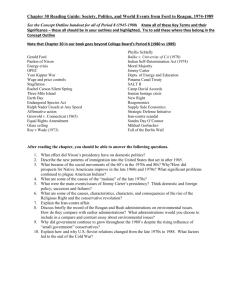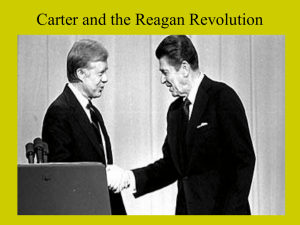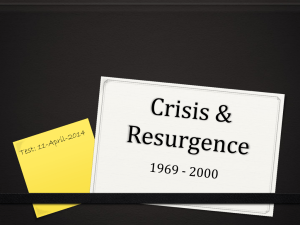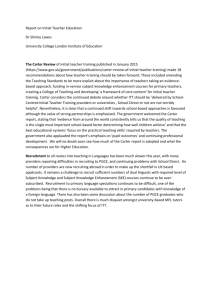The Age of Reagan: A History 1974-2008
advertisement
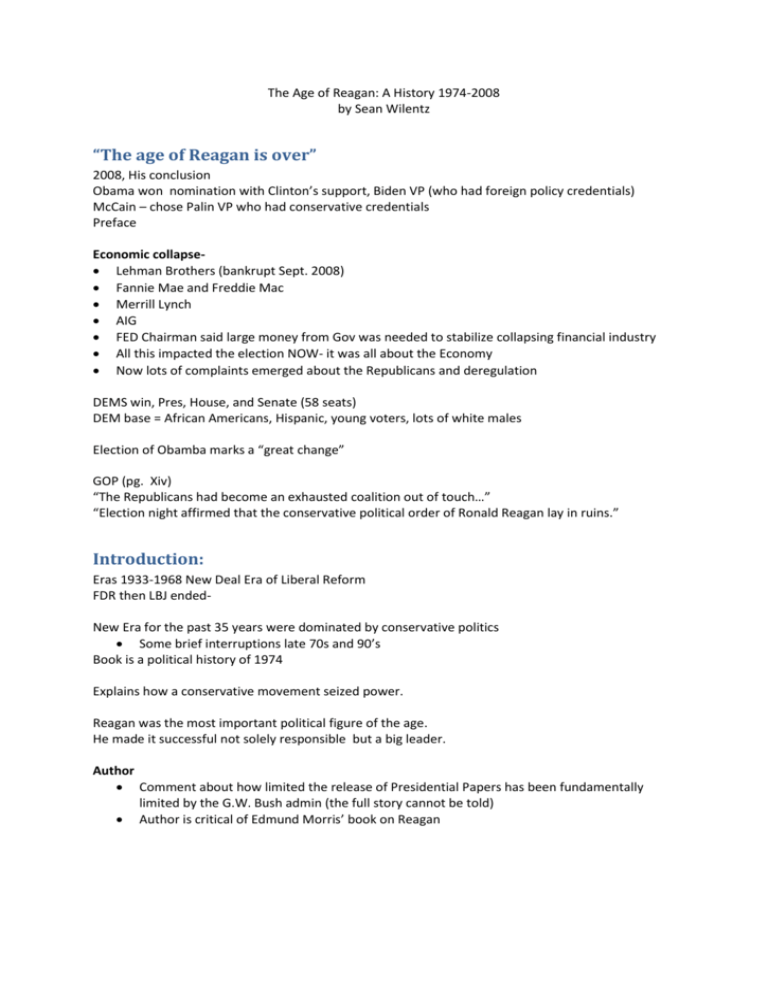
The Age of Reagan: A History 1974-2008 by Sean Wilentz “The age of Reagan is over” 2008, His conclusion Obama won nomination with Clinton’s support, Biden VP (who had foreign policy credentials) McCain – chose Palin VP who had conservative credentials Preface Economic collapse Lehman Brothers (bankrupt Sept. 2008) Fannie Mae and Freddie Mac Merrill Lynch AIG FED Chairman said large money from Gov was needed to stabilize collapsing financial industry All this impacted the election NOW- it was all about the Economy Now lots of complaints emerged about the Republicans and deregulation DEMS win, Pres, House, and Senate (58 seats) DEM base = African Americans, Hispanic, young voters, lots of white males Election of Obamba marks a “great change” GOP (pg. Xiv) “The Republicans had become an exhausted coalition out of touch…” “Election night affirmed that the conservative political order of Ronald Reagan lay in ruins.” Introduction: Eras 1933-1968 New Deal Era of Liberal Reform FDR then LBJ endedNew Era for the past 35 years were dominated by conservative politics Some brief interruptions late 70s and 90’s Book is a political history of 1974 Explains how a conservative movement seized power. Reagan was the most important political figure of the age. He made it successful not solely responsible but a big leader. Author Comment about how limited the release of Presidential Papers has been fundamentally limited by the G.W. Bush admin (the full story cannot be told) Author is critical of Edmund Morris’ book on Reagan Reagan’s Rise (Pg. 4) Confluence of factors Watergate Political turning point 1968 Nixon’s Southern political strategy Reagan used Nixon’s strategy on o School desegregation o Judicial appointments Reagan used Nixon’s men o Rumsfeld and Cheney Reagan used Nixon for advice while in the White House Nixon Conservatives Pat Buchannan- speech writer William SafireCollege Republicans Lee Atwater Karl Rove Still there were lots of differences between Reagan and Nixon Political Ideological Temperament Theme- How successful was Reagan? How did conservative ideologies work? How much did conservative ideology have to do with his success? 1. Supply Side Economics 2. Confronting the Soviet Union and their proxies The Reagan Era: Unfolded amid changes social and political Suburbs Civil Rights and Feminists movements broke down barriers The economy was declining 1973 New Party System Need for large amounts of money Upheaval of JFK, LBJ, and Nixon caused alienation Foreign Policy- divisions caused by Vietnam Reagan came to power as a result of this fragmented political environment Reagan’s Message: Problem with America was leadership solved by: Optimism Cut Taxes Shrink Government o =Small Federal Government o Cut spending Encourage private investment Keep Military strong Aid those abroad fighting communism (Pg. 8) The Age of Reagan Assumptions: Reduce taxes on the Rich was best solution for Economic problems (Supply Side = Trickle Down) Business leaders having input into Federal Policy Reagan Era Constitutional Crises: 1. 2. 3. 4. 5. Watergate Nixon Iran Contra Clinton Impeachment Supreme Court 2000 Election GW Bush War on Terror Prologue July 4, 1976 Ford trying to heal America (pg. 16) Status of America was for 2 decades of marching liberalism – “Alleviating the burdens of the underprivileged and poor was a national good.” “A lot of people would like to see it stop now.” Pg. 16 Nixon Watergate Break-in Violation of campaign ethics Cover up Nixon used the machinery of government to spy on o Domestic radicals o Mainstream critics o And political enemies Journalists Congressional leaders Presidents of Yale, Harvard and MIT Even Steve McQueen o Fabricated documents o Secretly conducting Foreign Policy Coup in Chile Bombing of Cambodia He Expanded Executive power by reorganizing the Federal Burercracy o He replaced career professionals with political loyalists o Reduced their independent power Nixon’s Charges Violation of Oath of Office and Constitutional violations Bills of Impeachment were included: 1. Abuse of power by conductiong illegal surveillance of citizens 2. Unlawfully using both the IRS and CIA in covert operations that violated the Bill of Rights Later it was discovered the “Huston Plan” White House plans to use surveillance and spy operatives to attack and investigate political opponents June 1974 Supreme Court forced Nixon to release secret tapes recordings Denied him executive privilege One taped conversation Nixon ordered the CIA to block the FBI investigation Nixon was finished Nixon Bio Ch. 3 Jimmy Carter and the Agony of Anti-Politics (Pg. 73) Election 1976 Election low turnout, only 54% - lowest since 1948 Carter’s Message: Personally moral Proud and upright Southern Baptist Annapolis Trained Navy Engineer Peanut Farmer God fearing Hardworking Pledged never to lie to the voters Reflected high moral character of the American people Playboy Interview: Before inauguration Carter was seen as mixed Weirdo/Sinner Evangelicals thought America was doomed Lots of criticism Evangelicals may have preferred Carter to Ford’s wife who made pro-abortion comments 1970 Governor of Georgia “Homespun boy” “The time for racial discrimination is over.” He was a humanitarian He started badly Energy Crisis Stagflation Political infighting or criticism Pro-Human Rights foreign policy (neo conservatives hated this) Pg. 75 Lacked Washington experience Anti-Capitol politics Carter floundered (Reagan will be empowered) 1875- Carter did have experience Rem. Congressional campaign (DNC) Official travel foreign affairs Trilateral commission o Private group Colombia University Zbignien Brzenski Pg. 76- Carter’s Advisors “Georgia Mafia” Hamilton Jordan Advisor Then Chief of Staff Bert Lance Budget Director of Office of Management but had to resign Brzenski Cyrus Vance Sec. of State LBS Admin California Sec. of Health Domestic Advisor Charles Schultze Council of Economic Advisors Schlesiger- <Nixon/Ford> NAT Security Advisor on energy Carter Technocrat Mizcho-manager He made the decisions Engineer like Wanted to increase minorities and women in upper level management Civil rights leader Advised on appointments Hud Juanita Kreps Sec. of Commerce Pg. 77 Caddell Advisor Coined the phrase ‘malaise’ = alienation Said Americans need a new kind of leader Admin 1st day Executive order Unconditional amnesty to draft borders Rejected elitism “Hail to the Chief” Legislature Agenda Economic problems renewed- 1977 Inflation 6%- rose every year 1979- 10+% Fed. raised interest rated Unemployment 6% 1980- 7.5% Deficit $68 Billion – Highest ever 1980 - $73 Billion (page 79) Carter’s Stimulus Package Every bill passed Welfare Reform Califano-Conflict Jobs instead of welfare Labor complained Tax Reform Caused in fighting in cabinet Scandal – Bert Lance, Director of OMB Accused of suspicious bank dealings – Resigned Carter Econ Advisor Economy was wealthy 7% Inflation and 7% unemployment Carter underestimated the problem Also fought with Democratic Congress over issues Point -> Carter did not understand the power of Congress He did not have pull in Congress Social Security Funding Problems Tax increase Not popular at all Enraged liberals by Declaring Gov. cannot fix poverty the recovery or reduce inflation or save the articles Pg. 83 Carter believed special interest hurt Gov. Tried to be the anti-politics leader He was fiscal conservative Wanted more efficiency – less fraud To help the needy to empower themselves He wanted to create a new mode in Washington Congress said no Congress was already in the anti-executive mode Carter misplayed the game Fight with Kennedy over health care plans Kennedy would challenge Carter for Presidential nomination Public was angry over inflation 9% Angry over high taxes California 1978 Howard Jarvis- Right Reagan- Right Created Prop. 13 Tax cut + limits Carter



